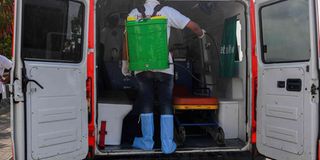Chemical spray booths dangerous, experts warn

An employee sprays disinfectant inside a HelpNow ambulance, after the government eased a nationwide lockdown imposed as a preventive measure against the Covid-19, in Mumbai.PHOTO | INDRANIL MUKHERJEE | AFP
The use of chemical spray booths is harmful to health, the Africa Centres for Disease Control and Prevention (Africa CDC) and the Infection Control African Network (ICAN) have warned, further calling it a waste of public resources.
This comes as experts warn that hand washing, sanitising, disinfecting houses, counter tops, office desks and tabletops, coupled with stay-at-home orders to avoid coronavirus infection could be detrimental to human immunity.
DISINFECTION
Tunnels, booths, or double-gated structures have all been employed to facilitate disinfection of human beings using chemicals with core counties, including Nyandarua, joining Mombasa, which was first to use spray sanitisers at the Likoni Ferry crossing.
During the launch, Governor Hassan Joho consulted experts from the Mombasa County Public Health Department and the Technical University of Mombasa (TUM) to ensure that the reagents used were safe, especially for those with respiratory issues and allergies.
Chemistry expert Josiah Odalo of TUM said the disinfectant was anti-microbial and it would help control the spread of the coronavirus.
“The kind of reagent you are going to disinfect yourself with is safe. We have prepared it using locally available resources from our laboratories, which is under good quality assurance mechanism. This formulation is quite safe and meets WHO standards,” he said at the time.
CAUSE CANCER
Now the top disease agency in Africa says direct spraying of humans with chemical disinfectant or exposing them to ultraviolet (UV-C) light is not recommended, given that these chemical are designed for use on hard surfaces.
“These chemicals can irritate the skin, mucosa (e.g. eyes, nose and mouth) and the respiratory tract. Additionally, they can irritate the digestive tract, cause cancer, and cause air pollution.
The doses and contact times needed for chemical or UV-C disinfectant to work are not feasible in a tunnel or with a sprayer, without causing considerable harm to humans, and may aggravate the transmission because of damage to the respiratory tract,” the African Union’s CDC said.
The agency noted that the chemicals used for disinfection had been tested only on surfaces, and are effective only when they follow a thorough cleaning protocol.
The agency notes that the high-pressure spraying of surfaces contaminated with the coronavirus might actually disperse the virus, causing it to spread even further.
It adds that spraying the environment is not effective because of the presence of soil and grass.






